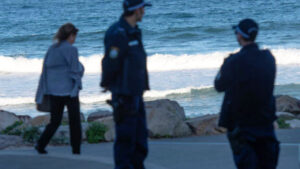Home » Commentary » Opinion » The Koronavirus Keystone Kops threaten our health and our liberty
· Spectator
 In the space of just a few weeks, the rule of law in Australia has both triumphed in the High Court’s judgement in Pell v The Queen and taken a battering from state governments’ social distancing rules under emergency powers invoked in the name of fighting Coved-19.
In the space of just a few weeks, the rule of law in Australia has both triumphed in the High Court’s judgement in Pell v The Queen and taken a battering from state governments’ social distancing rules under emergency powers invoked in the name of fighting Coved-19.
The rule of law does not mean imposing the iron fist of a police state — shades of which are to be found in the states’ restrictions. It means, among other things, transparency and lack of ambiguity in the law and the absence of arbitrary action in its application and enforcement.
Absent a police state, laws are only sustainable if they are respected by the citizenry. But in the way states are applying social distancing, the law lacks respect to the point it is an ass.
Most of us accept the need for some social distancing rules to apply for a short period, but it’s not just extreme libertarians who think the current restrictions go to absurd lengths, lack clarity, leave too much power in the hands of officials — and for all those reasons offend against the rule of law.
This commentary reflects the situation in New South Wales, but there are variations on the same themes in all states and territories.
The NSW rules are defined in a ministerial order issued under a 2010 public health act, the order itself having received no parliamentary scrutiny despite its far-reaching consequences for NSW residents.
The order includes a list defining which businesses and other establishments cannot open (a negative list), and a list of acceptable reasons for people to leave their place of residence (a positive list).
The negative list leaves the residual businesses and establishments to operate as normally as they can, while the positive list bans the residual reasons for people to leave home.
The negative list contains its share of over-reach, but it at least works like a normal restrictive law in an otherwise free society in that it defines what those subject to it CANNOT do.
The positive list approach offends against the very idea of a free society in that it is a law defining what we CAN do. Free societies don’t need to be told what they can do. The exceptions to our freedom should be defined by a ‘can’t do’ list, not a ‘can do’ list.
The inconsistencies, ambiguities and potential for misinterpretation in the NSW orders abound. Little wonder that people don’t know what they can and can’t legally do — and police and bureaucrats are making up their own interpretations as they go.
The NSW government health Coved-19 web site states that if you want to go out to shop it can only be for “essential” shopping, raising in the minds of citizens and police questions about what is ‘essential’. There are stories of police examining the contents of shopping bags before issuing warnings or on-the-spot fines. But the ministerial order does not use the word ‘essential’ in relation to shopping. You are free to shop for food or other “goods and services” for the household, which is very broad indeed. No mention of ‘essential’. The bureaucrats just made up their own version for the web site. And there is nothing to say you can only shop at the nearest supermarket if you prefer the one 10 kilometres away.
Then there is ‘exercise’, leaving home for which is a valid excuse under the order. What constitutes ‘exercise’ is undefined, but at least there is nothing to say it can only be legally accomplished by walking or running from your doorstep, as opposed to driving say 20 kilometres to your favourite bush track — or 100 for that matter.
Reportedly, over-zealous police are saying you can’t drive for that purpose. Again, they are making it up.
The rule of law isn’t like a decoration to be taken down when it becomes inconvenient to the exercise of state power. It is there to protect our freedoms from abuses of state power. The Berejiklian government should immediately rescind this repugnant ministerial order and replace it with something that is less restrictive, unambiguous and defines what residents of NSW cannot do, not what they can do.
In the meantime, it would not be surprising if everyone in possession of one of those on-the-spot police fines exercises their right not to pay it — and to have their case heard by a court.
The Koronavirus Keystone Kops threaten our health and our liberty